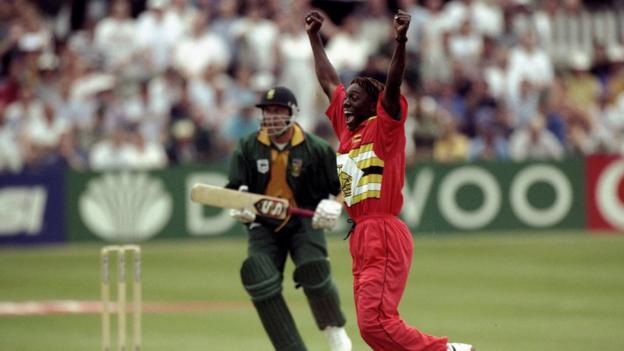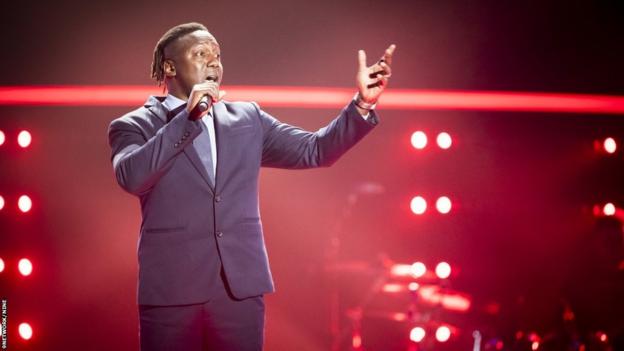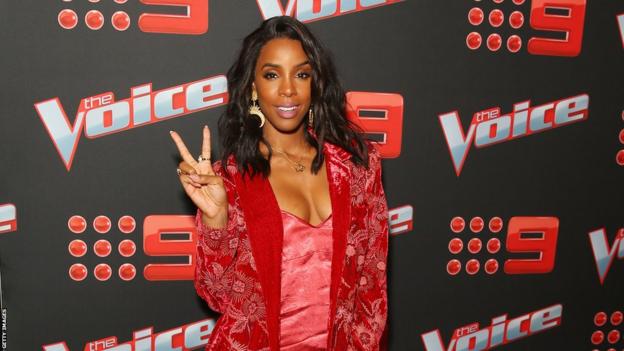Zimbabwe’s first black cricketer, Henry Olonga, says he has felt “hated” for 20 years following his black armband protest in opposition to his nation’s then-president, Robert Mugabe.
Olonga and team-mate Andy Flower made the stand in opposition to “the demise of democracy” of their nation on the jointly-hosted 2003 World Cup in South Africa and Kenya.
The pair have lived in exile ever since, whereas Mugabe remained in energy till 2017.
Flower would go on to teach England to successive Ashes triumphs.
A special path awaited Olonga with an look on TV expertise present The Voice in 2019, the place he was coached by Future’s Little one star Kelly Rowland, bringing him again to his old flame – singing.
A journey that started by escaping Zimbabwe beneath a blanket, nonetheless, has taken its toll.
“I am a forgotten individual so far as the world of cricket goes,” Olonga advised BBC Sport Africa.
“With every passing decade, it would develop in significance. The nearer to demise folks get, the extra they’re celebrated, I suppose. Once they move it is ‘they’re superb – he was such a courageous man’.
“For the primary 20 years – or 17, anyway, till Mugabe died – I felt like probably the most hated man in Zimbabwe.”
‘I used to be my very own man’
By the top of the competitors in 2003, Olonga – solely 26 on the time – joined the then 34-year-old Flower in saying his retirement from worldwide cricket.
“I might been referred to as all types of names – and that is what I needed to proceed to face for the primary decade after I did the protest,” Olonga recalled.
“Folks thought I wasn’t good sufficient to get up on my own: ‘Oh, Andy Flower bullied me into all of it’.
“Folks have been very unkind. They did not perceive the depth of thought that I put into doing the protest.
“I used to be my very own man.
“I am a person of spiritual conviction so my religion performed an element, however so did my rising political awakening. I met politicians who advised me what it was actually prefer to be in opposition to Mugabe.
“We had three or 4 years because the farm invasions started and have been coping with a overseas press always asking us whether or not we must always have sanctions imposed on us, due to the human rights violations again at residence and the crumbling rule of legislation.
“So there was a variety of meals for thought and I needed to digest loads. As soon as I assimilated it, I made a decision that was it.”

Olonga says the legacy of his actions nonetheless hang-out him now: “I’ve performed a variety of gigs the place Zimbabweans have been there. And so they generally say very unkind issues.
“My interactions with individuals are both bitter or candy. It’s extremely not often within the center and lots of people consider politics and sport should not combine.
“I am hyper-sensitive round cricket. Some folks – particularly cricket-loving Zimbabweans – assume I began the rotten Zimbabwe.
“Lots of people say, ‘all of it fell aside when Olonga and Flower did that’.
“Inside a yr or so in 2004, a variety of white gamers obtained kicked out or sacked and Zimbabwe cricket hasn’t totally recovered.
“I am not suggesting in any manner I shoulder accountability over that.
“The reality of the matter is, Australia’s my residence. It is the nation I’ll die in if I ever was given the selection. I do not see myself going again to Zimbabwe to dwell.
“In the event that they invite me again for the 50-year anniversary of the black armband protests, as a result of a extra liberal and democratic get together is in cost, perhaps I am going to go. I do not know.”
An exile’s journey from England to Australia
Mugabe, who died in 2019, was changed as president by Emmerson Mnangagwa after a coup in 2017.
Zimbabwe stays in political turmoil now, with opposition leaders alleging August’s elections, which handed Mnangagwa a second time period, have been rigged.
Olonga, now 47, started his exile in England earlier than transferring to Australia seven years in the past.
“My dad remains to be there [in Zimbabwe] – he’s in his mid-80s, and I do not know if I am going to see him once more,” Olonga mentioned. “My brother lives there however video calls aren’t the identical as assembly them in individual.
“I misplaced not solely my profession, however my residence. I misplaced a fiancé within the course of. Within the eyes of a variety of Zimbabweans, I misplaced any sense of respectability as a result of for the subsequent decade I used to be persona non grata and judged to the hilt.
“It is solely now with the passage of time folks have moved on. Mugabe is lifeless. Mnangagwa, Mugabe’s second in cost, is now in energy and I feel folks have been by way of a number of cycles of hyperinflation and struggling and ache.
“Now they’re saying: ‘perhaps we’ve been fooled, perhaps these guys had a degree 20 years in the past and we must always have paid consideration’.
“Persons are softening and are no less than seeing that I had a degree or that I ought to have had the fitting to have a degree as a result of there’s a variety of noise being made about Zimbabwe being a democracy.
“I’ve been constant in my condemnation of what has occurred and nonetheless continues to occur in Zimbabwe.”

Olonga, who at 18 was additionally his nation’s youngest participant, nonetheless holds the report bowling figures for a Zimbabwean in a one-day worldwide when he claimed 6-19 in opposition to England in 1999.
Three wickets within the three-run victory in opposition to India adopted on the 1999 World Cup.
With the transfer to Australia, his different burning ardour continued and he sung with the Adelaide Symphony Orchestra earlier than being introduced totally again into the media highlight.
“The Voice was fairly the expertise,” he recollects. “I did a gig with the police band on the native Adelaide City Corridor.
“Somebody made a remark, a overview or a video, and someway this labored its manner into the palms of the scouts at The Voice.
“Some of the harrowing experiences I had was doing the dwell audition. I used to be simply the oldest individual, by about 20 years, surrounded by youngsters – I used to be in all probability the one black individual within the room as nicely – you may think about the trepidation.
“It was an awesome expertise. It actually was. I selected Kelly Rowland as my coach. Being in that bubble was fairly surreal.
“It was fairly sobering for me as a result of I’ve come a good distance. I used to play cricket in Zimbabwe, I then did my factor after which ended up on a world stage, to indicate the world that I may ‘try’ to sing.
“I might have preferred to go additional,” he mentioned, having fallen simply in need of the ultimate. “However it was additionally an awesome privilege to be on the present.
“It is taken me almost 20 years to get my foot within the door. It is a main segue, and being completely sincere, I am kind of a struggling, broke musician.
“After Covid, I discovered myself unemployed for a few years, and struggling to get bookings and gigs. Now I do not simply sing, I inform my story as nicely. I do public talking, I feel that is my predominant supply of revenue, to be sincere.”
On The Voice, Olonga sang a rendition of Anthony Warlow’s hit ‘That is the Second’ whereas his renditions of Nessum Dorma have been among the many songs that grabbed consideration earlier than and after his look on the present.
Certainly, he conceded, when challenged on being a ‘broke’ musician, that his pursuit of a music profession might solely simply be starting given a tenor’s or baritone’s voices solely mature of their forties.
“I can keep on singing till I am unable to anymore and that is what I totally intend to do. I really like my music. I really like performing – I feel I am simply coming into my very own within the sense that my voice is reaching maturity now.

“I can forge a brand new path, and probably not give attention to whether or not I am remembered or forgotten as a lot on this planet of cricket.”
Whether or not Olonga’s second profession results in worldwide success in the identical manner his cricket profession did stays to be seen however it has come as a consolation to a person, who has already fought a battle few will ever face.
“It will be a sweeter second profession,” he mentioned. “Once I performed cricket, I had a lot of ups and downs. The political protest price me my profession, I obtained demise threats and needed to flee.
“All of that left a wound in me.
“Cricket was a messy divorce. Removed from being celebrated on the finish – being given a guard of honour – I used to be advised I could not be on the bus with the remainder of the workforce, had demise threats, went into hiding after which was vilified by my fellow countrymen – folks I used to be making an attempt to assist.
“Cricket has been a bizarre one for me – it was a supply of ache for a few years, in a manner that music by no means was.
“Music to me in a way was remedy.
“It’s extremely cathartic to have the ability to sing political songs about Zimbabwe. So I sing Redemption Track by Bob Marley. I wrote a track a few years in the past referred to as Our Zimbabwe, which is a really patriotic track about one’s delight in a single’s nation.
“Music actually has been a therapeutic balm for the loss I skilled in cricket.”
The 2027 Cricket World Cup returns to Zimbabwe
Olonga has not totally dominated out a extra imminent return to Zimbabwe however says he’ll solely go if invited. In 2027, Zimbabwe will co-host the Cricket World Cup as soon as once more.
Perhaps a neighbouring venue will carry him shut – both manner there isn’t a remorse.
“There was a track I realized in junior college from the movie ‘Goodbye, Mr. Chips’. It stayed with me, and it epitomises what we’re discussing.
“Within the remaining verse: ‘Within the night of my life I shall look to the sundown, At a second in my life when the evening is due. And the query I shall ask solely I can reply. Was I courageous and robust and true?’
“I believe that track has been an anthem for me in all of my life and had a job within the black armband protest.
“This concept of making an attempt to make a distinction, to make the world a greater place, to depart a legacy that individuals bear in mind you for extra than simply wickets, how a lot you made or how a lot of a reputation you made for your self.
“I do not assume they fulfill as a lot as doing the fitting factor and feeling that there was a second in time when you might have made a distinction and also you stood up and have been counted.
“So the guard of honour is actually not as satisfying as reflecting: I used to be courageous, I used to be robust, I used to be true – I used to be.
“That self respect is one thing that no-one offers to you. It’s a must to earn it by your selections and selections.
“I hope most individuals will assume that I used to be a person of substance, I used to be a person of conviction for what was proper.
“If I die understanding that lots of people no less than gave me kudos for that, then I’ve performed my my work on Earth.”
Henry Olonga has simply launched the ‘expanded’ model of his autobiography Blood, Sweat and Treason as an audiobook.